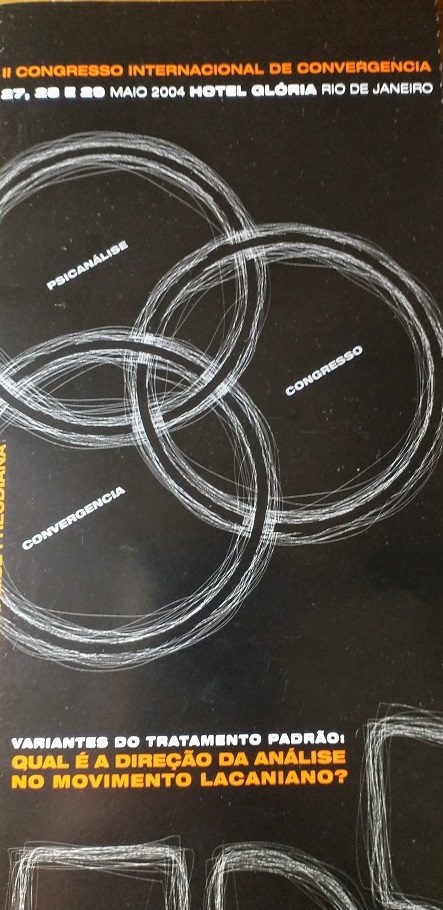II CONGRESSO DE CONVERGÊNCIA
Variants in the Standard Treatment.
What is the analysis direction inside the Lacanian movement ?
May 27th 28 th and 29th , 2004

Psychoanalysis evolves – from the turn of the XIX century to the XX century- as a subversion in scientific discourse, driving out the subject from his field of operation; a turning point in the relation between the subject and knowledge, and a step ahead in overcoming the antinomy theory X practice. In doing so, psychoanalysis let a huge range of human suffering encounter in the word the path for transformation.
What does psychoanalysis encompass nowadays, in this new turn of the century? In a globalized world, ruled by market pressure, what gives psychoanalysis motive for its strong sustenance? What is its praxis direction? What is psychoanalytical experience and what is the extent of influences on the life of those who look for it?
Incited by these questions, the institutions- member of “Convergencia, Lacanian Movement for a Freudian Psychoanalysis” will meet at the Hotel Gloria, Rio de Janeiro, on May 27th 28 th and 29th , 2004, for the II International Congress, whose purpose is to resume the discussion on the fundamental principles of the analytical practice around the theme “ Variantes do Tratamento Padrão. Qual a direção da análise no movimento lacaniano?” (Variants in the Standard Treatment. What is the analysis direction inside the Lacanian movement ? )
The choice for the theme “ Variantes do tratamento padrão “ (Variants in the Standard Treatment) had as one of its main reasons question again the ethics in which as psychoanalysts we sustain, through the proposed discussion by Lacan in the text under the same name. When summoned to talk about his theme, from which an ambiguity stands out, Lacan drew attention to the necessity of an ethic strictness “ out of which any treatment, even filled with psychoanalytical knowledge , is nothing else but psychotherapy.
Is it feasible to talk about standard treatment in psychoanalysis? What logic presides over the existence of variants, when we follow freudian teachings assuring that each case must be taken in its own singularity, as if it were the first ? If there is no standard technical knowledge guiding the psychoanalyst action, the category variants presents itself as a structural and not fortuitous condition of the psychoanalytical practice, that can only be sustained by the ethic strictness.
Our starting point comes from Lacan´s statement that what the analyst must know is to ignore what he knows. Acting this way, he produces a displacement, not only of the place from which the rising of the truth is expected, but also of his own way to elaborate the knowledge that will result from experience. It is this way that “ the psychoanalyst distinguishes himself by doing, from a function common to every man, a usage that cannot be reached by everyone, when he carries the speech”. His word can only be effective if it is on the same level with his being, in a way that he carries the thread from which the discourse of the analyzed person let him produce that word.
At this point we mention the radical difference that lies between the psychoanalytical practice and kinds of psychoteraphy that spread around nowadays, offering solutions to “the grief of existing“. No way psychoanalysis allows somebody to take himself for the Other. Just the opposite, the ignorance that shows itself by the not-knowing that guides the analyst´s interventions, as speech messenger, should make the subject say what he has to say, using his own words, from the point where he recognizes the law that rules his being. As for the analyst, “ The analyst´s being, in fact, is acting even in his silence, and it is during the relieving of the truth that supports him that the subject states his speech.” It is not for any other reason that in “The direction of the treatment and the principles of its power (1958). Lacan reminds us that the analyst must know the direction, not of the analyzed person, but of the treatment, linked by the words of the analyzedperson, at odds with the difficulties imposed by them, and by the sense they are impregnated.
Such questions have taken us, as Lacanian oriented psychoanalysts registered in almost fifty psychoanalytic associations in several countries in the world, to propose the discussion of the fundamental issues that could be considered as the psychoanalytical practice delimitation, from the following thematic axes:
LOGIC AND ETHICS OF THE VARIANTS
THE PASSIONS OF THE BEING AND THE KNOWLEDGE OF THE PSYCHOANALYST
DIRECTION OF THE ANALYSIS AND CLINICAL STRUCTURES.
STATUTE OF THE SUBJECT AND THE DESTINY OF THE “EGO” IN THE ANALYSIS
TRANSFERENCE, RESISTANCE AND INTERPRETATION.
THE END OF ANALYSIS AND THE FORMATION OF THE PSYCHOANALYST.
Everybody is invited to attend this Congress and work with us; not only psychoanalyst practioners, but also those interested in psychoanalytical experiences. Returning to the crucial questions presented for the exercise of our practice, it is suitable to remind Freud´s statement that psychoanalysis is a non-expert, sine qua non condition to avoid any fossilization of his discourse. The Congress is an opportunity for all to listen and make use of their speech, the only way through which Psychoanalysis can bring their contribution to the questions that affect our present world.
